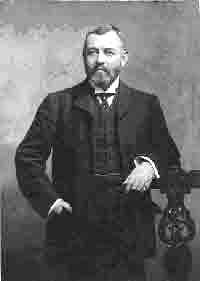The Missionary Alexander McCaul and His Jewish Interlocutors: The Revival of the Jewish-Christian Debate in Nineteenth-Century Europe
Alexander McCaul (1799-1863) was one of the most prominent figures in The London Society for Promoting Christianity amongst Jews during the first half of the nineteenth century. In 1837, he published a formidable attack against the Talmud entitled The Old Paths, engendering considerable consternation and alarm among Jews when the work appeared in Hebrew translation two years later. Having spent ten years as a missionary in Warsaw, McCaul knew Jewish texts and Jewish life intimately. His work engendered a series of long responses from Jewish intellectuals attempting to defend traditional Judaism from his stinging criticisms. Among the most significant of these responses were several written by Eastern European Maskilim [proponents of the Jewish enlightenment] who had previously condemned the rabbis and their restrictive Talmudic laws in calling for radical religious and educational reform. The irony of these same critics of Rabbinic Judaism feeling obliged to defend their hallowed traditions is at the heart of my study of McCaul’s critique and the Jewish response. Their treatises constitute invaluable Jewish self-reflections on the meaning of their newly constructed identities in the nineteenth century.
David B. Ruderman is presently the Joseph Meyerhoff Professor of Modern Jewish History and was formerly Ella Darivoff Director of the Herbert D. Katz Center for Advanced Judaic Studies at the University of Pennsylvania from 1994-2014. Prior to coming to Pennsylvania, he taught at the University of Maryland [1974-83] and at Yale University [1983-94]. He is the author of many books and articles including The World of a Renaissance Jew, 1981; Kabbalah, Magic, and Science, 1988; A Valley of Vision, 1990; Jewish Thought and Scientific Discovery in Early Modern Europe, 1995, 2001, published also in Italian, Hebrew, and Russian; Jewish Enlightenment in an English Key: Anglo-Jewry’s Construction of Modern Jewish Thought, 2000; Connecting the Covenants: Judaism and the Search for Christian Identity in Eighteenth Century England, 2007, Early Modern Jewry: A New Cultural History, 2010; and A Best-Selling Hebrew Book of the Modern Era, 2014. Three of these books, including the last, won national book awards in Jewish history. He has also edited or co-edited five other books and co-edited two popular textbooks. He is a past president of the American Academy for Jewish Research. The Great Courses/Teaching Company has produced two of his Jewish history courses, each in 24 lectures. In 2001, the National Foundation for Jewish Culture honored him with its lifetime achievement award for his work in Jewish history. In 2014, his colleagues presented him with a festschrift entitled Jewish Culture in Early Modern Europe: Essays in Honor of David B. Ruderman, eds. Richard Cohen, Natalie Dohrmann, Adam Shear, and Elhanan Reiner (Pittsburgh, 2014).

